Iran deal sets 2016 clash between Hillary Clinton and GOP hopefuls
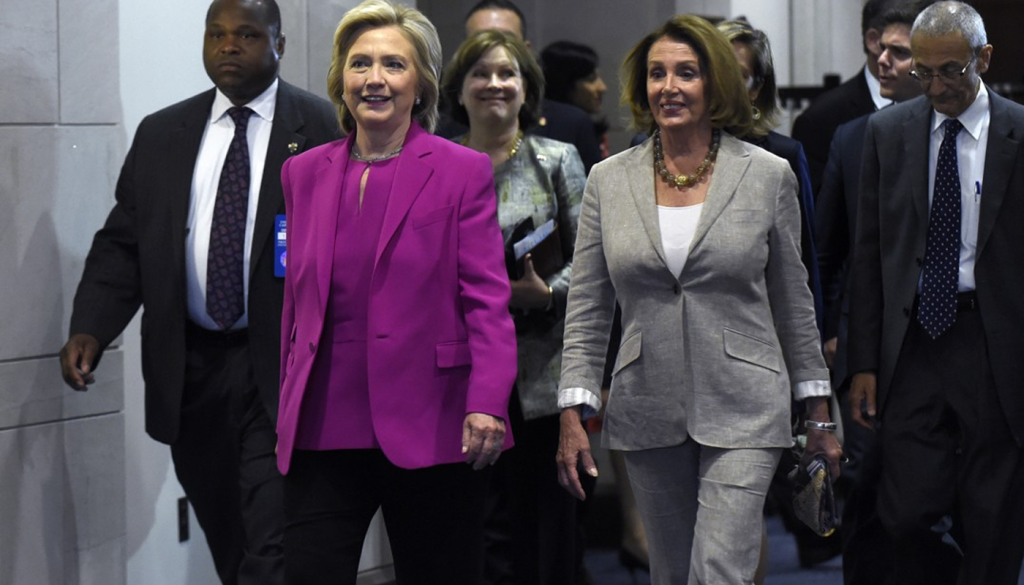
Hillary Rodham Clinton embraced a landmark nuclear deal with Iran on Tuesday, calling it the most effective path for the U.S. to prevent Iran from acquiring nuclear weapons. But she warned it would need strict enforcement, underscoring the tension between President Barack Obama‘s foreign policy legacy and the White House aspirations of his first secretary of state. In a lengthy statement released late Tuesday, Clinton said she supported “the agreement because it can help us prevent Iran from getting a nuclear weapon.” But her written statement, following a day of meetings with Democratic lawmakers in Congress, also called for a “clear-eyed” assessment of the threat Iran represents to the U.S. If elected, she vowed a tough response if Iran failed to live up to its end of the bargain. “We can never permit Iran to evade its obligations or to place any suspicious site off limits to inspectors,” Clinton wrote. “And the response to any cheating must be immediate and decisive – starting with the return of sanctions but taking no options off the table, including, if necessary, our military options.” Clinton has largely supported the Obama administration’s negotiations over the past two years. She has stayed involved with their progress with regular briefings, according to aides who spoke on the condition of anonymity because they weren’t authorized to publicly discuss private meetings. But navigating the political nuances of a historic agreement with a decades-long U.S. enemy heading into a presidential election year may end up being far more complicated. On Tuesday, Republican candidates signaled that Clinton would be forced to defend her position in the general election and warned of violent chaos in the Middle East as a result of the agreement while calling on Congress to try to halt it. Campaigning in Iowa on Tuesday, former Florida Gov. Jeb Bush called Obama’s actions “naive and wrong.” “This isn’t diplomacy – it is appeasement,” said Bush, one of the many Republicans who lashed out over the agreement. Wisconsin Gov. Scott Walker said the bargain “will be remembered as one of America’s worst diplomatic failures.” Florida Sen. Marco Rubio, who, like Walker, has vowed to rescind the agreement should he be elected president, said: “I believe this deal undermines our national security.” Though a slim majority of Americans back diplomacy with Iran, 56 percent consider Iran an enemy of the U.S., according to a new Associated Press-GfK poll taken before the deal was announced. Israeli leaders – who hold sway with some Jewish voters – see the agreement as a threat to their country’s very existence. And Republicans have already spent months trying to link Clinton to Obama, who has seen approval ratings for his foreign policy sink in his second term. Clinton’s current place in the Iran debate marks a striking role reversal for the second-time presidential candidate and her long-ago rival. In 2008, she called Obama’s offer to meet with Iran’s leader without preconditions “irresponsible and, frankly, naive.” And when Clinton said she would “obliterate” Iran if the country used nuclear weapons against Israel, Obama likened her “bluster” to the “tough talk” of then-President George W. Bush. Four years later, as secretary of state, Clinton dispatched a top adviser, Jake Sullivan, to participate in the secret meetings with Iran through the sultan of Oman that led to the start of the international negotiations. Sullivan, who could serve as Clinton’s national security adviser if she’s elected, declined to speak for Clinton during a breakfast with reporters. When asked for his own views, Sullivan said: “I believe that this deal is the best and most effective way to prevent Iran from getting a nuclear weapon. That’s my personal view.” Clinton, however, has long wondered publically whether a deal would ever take shape. She told an American Jewish organization last year that she was “skeptical the Iranians will follow through and deliver.” She said she had “seen many false hopes dashed through the years.” Now, skeptical congressional Democrats are looking to Clinton for direction as they weigh the completed agreement. With the deal between the world powers now finalized, Congress has 60 days to assess the accord and decide whether to pursue legislation imposing new sanctions on Iran or try to prevent Obama from suspending existing ones. If Clinton wins, her commitment to implementing the agreement will play a huge factor in its potential success. “She’s one of two of the most important, most influential voices in this debate, the other being President Obama,” said New York Rep. Steve Israel, who met with Clinton on Tuesday morning. “Her opinion is critically important.” Though Clinton praised the deal, she warned that the agreement would not end Iran’s “bad behavior” in the region, such as sponsoring terrorists, and noted that the country remains a major threat to Israel. The Democratic Senate leader, Sen. Harry Reid of Nevada, said Clinton had told the rank-and-file privately “let’s find out for sure what’s in it.” After meeting earlier with Clinton, House Democrats said she offered a far more positive assessment behind closed doors, though they noted that Clinton did not explicitly urge them to vote in favor of the deal. “She endorsed it. Full-throated,” said Virginia Rep. Gerry Connolly, who attended the closed-door meeting. “She was not equivocal at all in her support of the deal as she understands it.” Republished with permission of The Associated Press.
Presidential primary brief: 484 days until Election Day
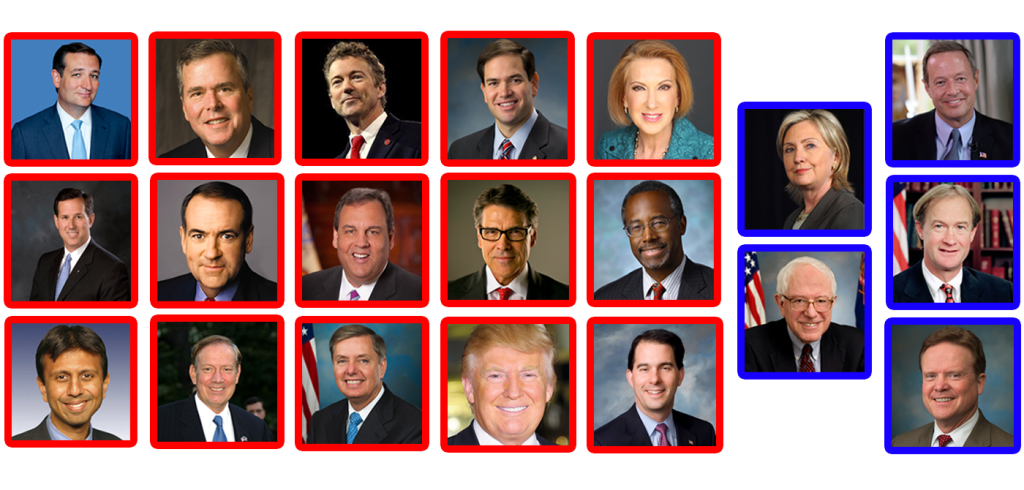
Welcome to the Monday presidential primary brief provided by Alabama Today. Every week you can find your latest headlines on the presidential primary races as we count down the days until Election Day. 230 days until AL Presidential Primary 484 days until Election Day Convention Dates: Republican July 18-21 2016, Democratic July 25-28 2016 Weekly Headlines: Scott Walker announces campaign blitz after 2016 announcement Republican Jim Gilmore to enter 2016 race for president Biden campaign team taking shape Press Clips: Global warming will play major role in 2016 presidential election (The Patriot News 7/12/15) Pope Francis in mid-June issued an encyclical calling for the world to combat global warming. It was developed with advice from the best scientists in the world, including world-‐famous British physicist/cosmologist Stephen Hawking. The Dalai Lama has endorsed the message. This will force a titanic, worldwide discussion on the issue — partly a scientific debate, partly a food fight from deniers, skeptics and people who honestly feel we have better things to spend our money on. Only one poll number right now tells us anything meaningful about the 2016 election (Washington Post 7/10/15) Although the 2016 election is nearly 500 days away, the nation — or at least the nation’s political junkies — remain hungry for news about the presidential campaign. But what news is there? Polls. So far — in 2015 alone! — no fewer than 57 polls have asked voters to choose between hypothetical nominees Republican Jeb Bush and Democrat Hillary Rodham Clinton. So it’s useful to be mindful that “trial heat” polls conducted now have zero ability to predict the winner of an election that’s 16 months away. Polls don’t even tell us much about primaries and caucuses that are six months away. Upcoming polls to lock in GOP debate Field (Politico 7/7/15) John Kasich may be the last Republican to enter the presidential fray, but his timing could be the best: Exactly two weeks after the splash of his planned announcement on July 21, Fox News Channel will average together the latest polls of the Republican Field and determine which 10 of the 16 announced candidates will participate in the First debate in Cleveland. Making the cut gives a candidate the platform to stand out in a crowded Field; not making the cut leaves him or her knocking on the door. Immigration reform key issue in 2016 election (USA Today 7/6/15) At her job at an investment management firm in small-‐town Nebraska, Analy Gonzalez is “constantly reminded” of the economic strain immigrant workers face. Gonzalez, who often works with migrant workers, says she sees firsthand the need for immigration reform, particularly for young immigrants. “Speaking about immigration reform is something that you grow up with having an immigrant family,” the 25-‐year-old says. “A lot of the people that I help are immigrants working really difficult jobs with no education, just trying to get by.” Jim Webb clarifies position on the Confederate flag (CBS News 7/9/15) Democratic presidential candidate and former Virginia Sen. Jim Webb said Thursday that the Confederate Flag at the South Carolina Capitol has “long been due to come down,” but he also called for some historical perspective on the issue, suggesting people should not use the debate over the flag to demonize the South. “The Confederate battle flag was a battle flag. It assumed a lot of unfortunate racist and divisionist overtones during the civil rights era,” Webb said in an interview on CBS This Morning, his first with a national broadcast outlet since announcing his candidacy earlier this month. The demographics of 2016 look brutal for Republicans (Washington Post 7/10/15) If you want to understand why the debates over the Confederate flag and Donald Trump’s immigration outbursts have so many senior Republicans reaching for their acid reflux pills, take a look at this bracing new demographic analysis from Charlie Cook and David Wasserman. Cook and Wasserman note that historical patterns should favor the GOP in the 2016 presidential election, because the same party rarely keeps the White House after previously holding it for two terms. But that advantage will be swimming upstream against these demographics. How Bernie Sanders plans to win and change Washington (CBS News 7/12/15) Sen. Bernie Sanders, I-Vermont, says he’ll be able to build a giant grassroots movement of support to win the Democratic nomination and the 2016 election, but that he’ll also go one step further than President Obama did successfully harness his grassroots support to change Washington. In an interview on CBS’ Face the Nation Sunday, Sanders said that the president ran “one of the great campaigns in the history of the United States of America” in 2008, but he also made a mistake by trying to negotiate fair compromises with Republicans and their leadership in Congress.
Scott Walker reminds voters of union wins as he enters 2016 race

Wisconsin Gov. Scott Walker announced on social media Monday morning that he’s running for president, tweeting “I’m in.” Walker, a Republican who built a national profile largely due to his clashes with labor unions, also released a campaign video at the same time declaring his entry in the race. The video is heavy on images of Walker speaking to a crowd in an Iowa cornfield, as well as his 2010 battle with unions. The video includes Walker speaking directly to the camera touting his willingness to take on big fights. “We didn’t nibble around the edges,” he says. Walker has a national profile largely due to his clashes with labor unions. He enacted policies weakening their political power and became the first governor in U.S. history to defeat a recall election. Now, on the eve of his campaign launch, Walker’s task is to remind Republican voters about the four-year-old fight and the recall election sparked by his efforts to weaken unions — and a series of lesser-known triumphs he says set him apart from the crowded Republican field. “If you could accomplish half of what he’s done in Wisconsin in Washington, D.C., you would go down as one of the greatest presidents ever,” said Walker’s top political adviser Rick Wiley. Walker cut income and corporate taxes by nearly $2 billion, lowered property taxes, legalized the carrying of concealed weapons, made abortions more difficult to obtain, required photo identification when voting and made Wisconsin a right-to-work state. His budget this year, which plugged a $2.2 billion shortfall when he signed it into law Sunday, requires drug screenings for public benefit recipients, expands the private school voucher program, freezes tuition at the University of Wisconsin while cutting funding by $250 million and removing tenure protections from state law. Such achievements may appeal to conservatives who hold outsized sway in Republican primaries, yet some could create challenges in a general election should Walker ultimately become the GOP’s nominee. Voter ID laws, abortion restrictions, liberal gun policies and education cuts are not necessarily popular among swing-state independents. “Ultimately Walker has to show all these victories and political successes have shown real results,” said Democratic pollster Paul Maslin. Walker’s record is well-known to Wisconsin voters, a state where the second-term governor engenders fierce loyalty and fierce opposition. Protesters who first crowded the state Capitol in 2011 in demonstrations as large as 100,000 still gather daily, although only about a dozen or so at a time, to sing anti-Walker songs. Anger over Walker’s 2011 union law led to the failed 2012 recall. His team created a video this week, called “Recall the Recalls,” to tell that story again, especially for those who are taking their first serious look at Walker as a presidential candidate. And while he’s not yet a presidential candidate in the eyes of the law, the labor dispute helped give him a significant head start in the 2016 money race. Walker’s three governor’s races left him with a far-reaching donor database of more than 300,000 names. He shattered state fundraising records, collecting $83 million for his three Wisconsin elections, much of it coming from outside the state. He begins his 2016 presidential bid with at least $20 million to spread his message, raised by two outside groups not subject to campaign finance donation limits, according to sources with direct knowledge of the fundraising operation. They spoke on the condition of anonymity to publicly discuss private fundraising strategy. Walker’s union clashes will be featured prominently on the day of his announcement, to be held in the same convention hall where he hosted his victory party after the recall election. “A lot of people, that was their first introduction to Walker,” Wiley said, calling the union battle and subsequent recall win “one of our biggest assets.” Yet the specific impact of Walker’s fight with labor unions is open to debate. The governor often highlights rising test scores and graduation rates as evidence that the 2011 union law worked. What he doesn’t mention is Wisconsin’s graduation rates were increasing for years before he took office, and the recent growth is not as strong as the national average. Wisconsin’s ACT scores have been among the best in the nation since before Walker was elected. They ranked third the year before he took office and ranked second in 2012. Walker also talks about how the 2011 union law saved taxpayers $3 billion as of late 2014, saying state and local governments have used “tools” he provided them to reduce spending on pensions and health benefits for public employees. While it’s true that the state and local governments have saved roughly that amount, the costs have been shifted to the employees who have to pay more for those benefits. Critics note that Walker too often ignores where he’s fallen short. The state’s chief economic development agency that Walker created, a hybrid public-private partnership, has been beset with problems, including handing out $124 million in loans without properly vetting the recipients. Walker was over 100,000 jobs short on his signature 2010 campaign promise to create 250,000 private-sector jobs. Wisconsin’s job growth has lagged not only the national average but its Midwest neighbors as well. He’s also been dogged by two investigations, neither of which have yet to result in charges filed against him. The first resulted in a variety of criminal convictions, including misconduct in office, against six of his former aides and associates when he was Milwaukee County executive. The second investigation, currently on hold while the state Supreme Court considers a trio of lawsuits, centers on whether Walker’s recall campaign illegally coordinated with independent groups. Republished with permission of the Associated Press.
GOP White House hopefuls scramble for anti-abortion vote
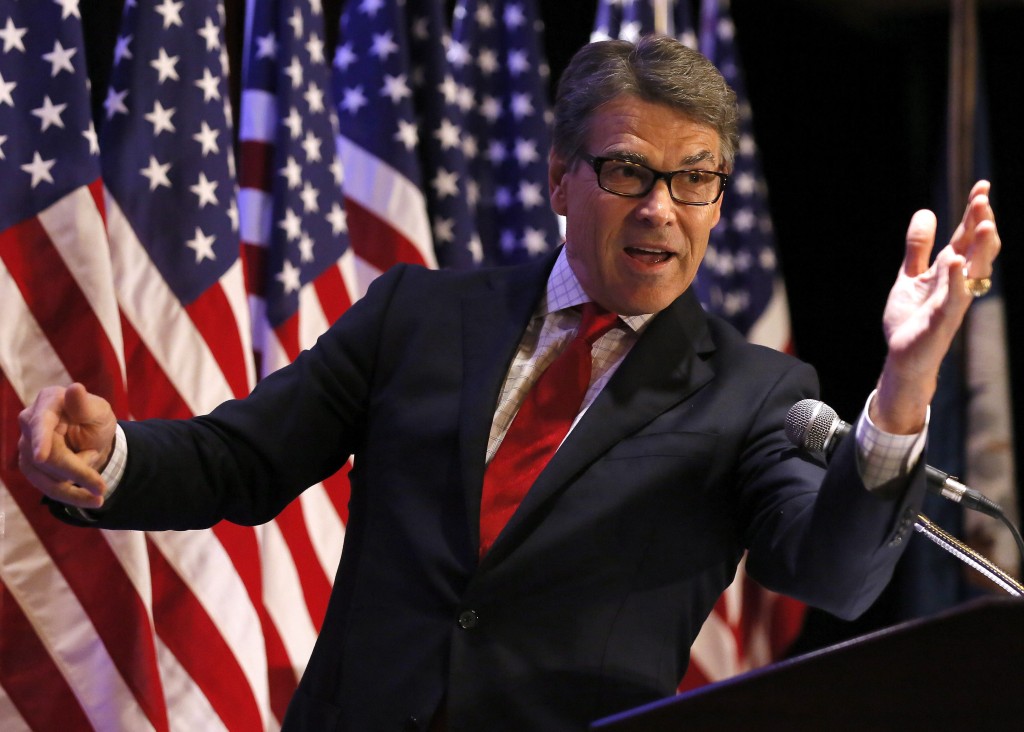
Trying to distinguish themselves in front of an important group of social conservative activists, Republican White House hopefuls on Friday used the National Right to Life Convention to share personal stories and detail the abortion restrictions they’ve helped write into law. The question now is whether the scramble helps or hinders an anti-abortion movement seeking unity as Republicans look to win back the presidency next November. National Right to Life Political Director Karen Cross urged the assembly to “make a decision right now that the issue of life trumps all else.” “There is no such thing as the perfect candidate,” she warned. Carol Tobias, the group’s president, argued in an interview that President Barack Obama benefited in both of his national victories from social conservatives who didn’t back John McCain in 2008 or Mitt Romney in 2012. “The quickest way to defeat a pro-lifer,” Tobias said, “is to fall in love with your candidate and then get your feelings hurt when they don’t win the nomination.” The candidates gave repeated nods to those sentiments, praising each other and hammering Democratic favorite Hillary Rodham Clinton, who supports abortion rights. Still, they spent most of their energy asserting their own conservative supremacy on the issue. Santorum boasted of how he sponsored the federal law that bans certain late-term abortion procedures after initially soft-pedaling his abortion stance because of Pennsylvania’s closely divided electorate. “You know me; there’s no quit in this dog,” he said. “Go ahead and nominate somebody who’s just going to go along. Then try to convince yourself you’ll make a difference.” Rick Perry predicted the next president will nominate as many as four Supreme Court justices — who could presumably overturn the 1973 Roe v. Wade ruling that legalized abortion nationally. “If I have the opportunity to put justices on the Supreme Court, they will not be squishy,” the former Texas governor said. Florida Sen. Marco Rubio explained his abortion opposition as “inseparable from the effort to reclaim the American dream … for every child,” and recalled abortion restrictions he helped pass as speaker of the Florida House of Representatives. Jeb Bush, whose tenure as Florida governor overlapped Rubio’s speakership, mentioned some of the same laws in a video presentation. He did not physically attend the convention. Ben Carson, a retired neurosurgeon, has never held elected office, but he blasted abortion providers as “evil.” Tobias said her group doesn’t wade into primaries in part because it’s hard to find meaningful distinctions between candidates, though she acknowledged the campaigns will find them. New Jersey Gov. Chris Christie supported abortion rights earlier in his career, something he generally avoids talking about now. Wisconsin Gov. Scott Walker celebrated passage of a new state ban on most abortions beyond the 20th week of pregnancy. Yet late in his 2014 re-election campaign, he aired an ad in which he affirmed his abortion opposition while emphasizing that Wisconsin law “leaves the final decision to a woman and her doctor.” South Carolina Sen. Lindsey Graham has sponsored a ban on abortions after 20 weeks. But some conservatives blast him for voting to confirm Obama’s two Supreme Court nominees. Tobias said those details sometimes matter to abortion opponents, but she maintained that nitpicking is counter-productive. For many anti-abortion voters, she said, choosing a primary candidate is about “trust” and “personal feel” rather than policy. The candidates’ approaches here suggest they understand that. Rubio and Perry talked about seeing their children on ultrasounds during pregnancy. Carson, a retired neurosurgeon, talked about how he gravitated to pediatric surgery because of how much he values children. Louisiana Gov. Bobby Jindal talked Thursday night about having to defend his anti-abortion stance in his interviews for medical school. Santorum tells the story of doctors advising that his daughter, Bella, who suffers from a rare genetic disorder, would not have a good quality of life and could die as an infant. “There is no better way to preach the gospel of life,” Santorum said Friday, than to have school-age Bella “in the White House.” Public opinion, meanwhile, remains divided. An Associated Press-GfK poll conducted in January and February found that 51 percent of Americans think abortion should be legal in all or most cases, while 45 percent think it should be illegal in most or all cases. At NARAL Pro-Choice America, a leading abortion rights advocacy group, Sasha Bruce said that means Republicans “are fighting over a slice of the minority,” putting them at a disadvantage in November. Tobias countered that among voters who rank abortion as a key issue in deciding on a candidate, “we win a majority of them.” Her movement’s job, she said, is to increase the share of voters who cast their vote “based on the life issue. If we do, we win.” Bruce said her organization is focused on educating general election voters about the success abortion opponents have had limiting abortion access through state-by-state restrictions. “They aren’t overturning Roe v. Wade, but they’re just chipping away,” she said. Republished with permission of The Associated Press.
Scott Walker tweet says he’s running, but who posted it?
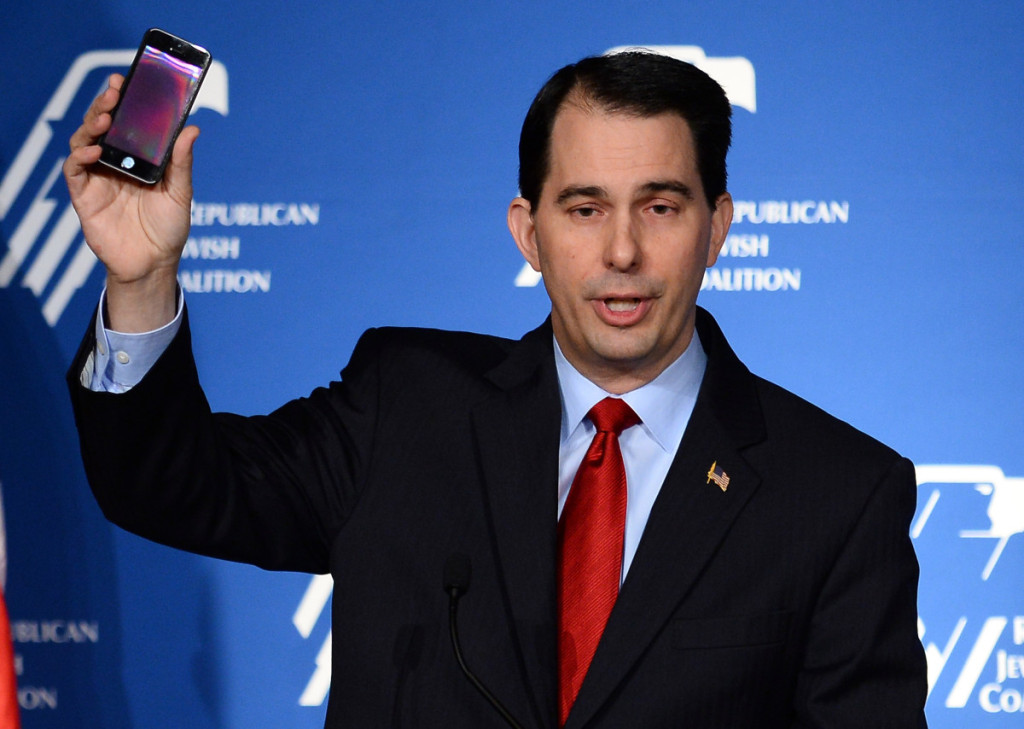
Twitter says it’s investigating a premature presidential announcement that popped up on Wisconsin Gov. Scott Walker‘s account Friday evening. The message, which was quickly deleted, said, “Scott Walker is running for president.” Twitter spokesman Nu Wexler said later, “We’re looking into today’s issue, and we’ve determined the Walker team was not at fault.” After the initial tweet, the Walker campaign did not deny responsibility, saying only, “Stay tuned for Governor Walker’s announcement on Monday.” Later, Walker press secretary AshLee Strong said, “We’re happy Twitter confirmed this wasn’t Team Walker’s post and are investigating what happened.” It’s no secret that Walker will enter the 2016 Republican presidential race in Wisconsin on Monday afternoon. He is set to become the 15th Republican presidential candidate after he confirms his intentions Monday. Republished with permission of The Associated Press.
As Republican infighting grows, donors call for calm
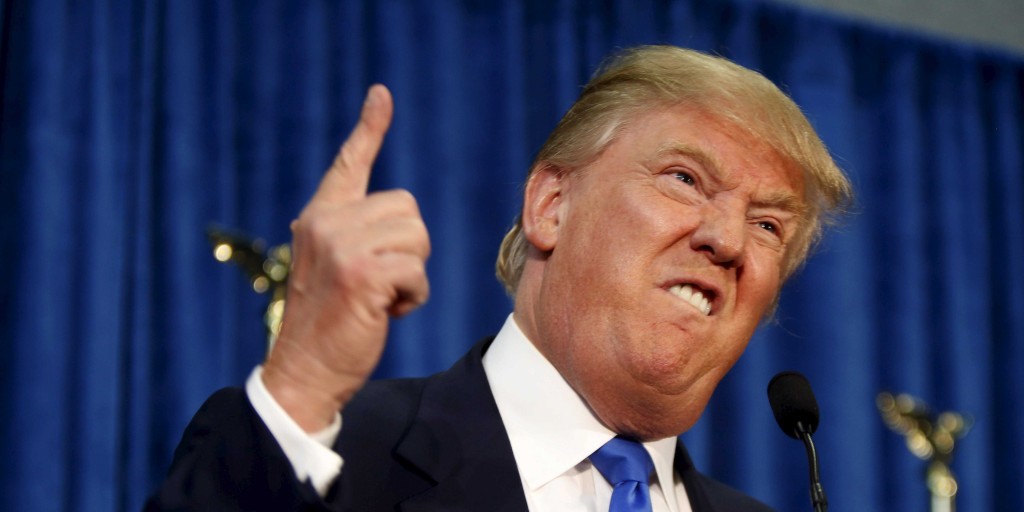
Worried about “Republican on Republican violence,” top party donors are taking action, with one firing off a letter calling for more civility and another seeking to block businessman Donald Trump from the debate stage altogether. Foster Friess, a Wyoming-based investor and one of the party’s top 20 donors in the last presidential contest, issued a letter to 16 White House prospects and the Republican National Committee late last week calling for candidates to stay on the “civility reservation.” “Our candidates will benefit if they all submit to Ronald Reagan‘s 11th Commandment, `Thou shall not speak ill of a fellow Republican,’” Friess wrote in a copy of the letter sent to Republican National Committee chairman Reince Priebus and obtained by The Associated Press. In the dispatch, Friess cites the backing of casino magnate Sheldon Adelson and Chicago Cubs co-owner Todd Ricketts. “Would you join the effort to inspire a more civil way of making their points?” Friess wrote. “If they drift off the `civility reservation,’ let’s all immediately communicate that to them.” The call for calm comes as the sprawling Republican field shows signs it could tip into a bare-knuckles struggle for the nomination — a scenario that the party’s elite donors see as a distressing echo of four years ago. New Jersey Gov. Chris Christie on Monday charged that Republicans don’t need Texas Sen. Ted Cruz‘s “lectures.” Wisconsin Gov. Scott Walker repeatedly dismisses Republicans in Congress as doing little. And Kentucky Sen. Rand Paul regularly jabs his Republican opponents by name. Yet no candidate has injected more provocation into the 2016 Republican presidential primary than Trump. While few party officials see the reality television star as a credible candidate, he has lashed out at a growing number of Republican critics who have condemned his recent description of Mexican immigrants as criminals and rapists. Trump over the weekend posted a message from another user on his Twitter account charging that former Florida Gov. Jeb Bush “has to like the Mexican illegals because of his wife,” Columba, who was born in Mexico. Campaigning in New Hampshire over the weekend, Bush said he “absolutely” took the remark personally. Trump has not apologized, but spokeswoman Hope Hicks on Monday said, “This was a retweet from somebody else” about a news story. But Trump stood firm on his comments about immigrants Monday, saying “the Mexican government is forcing their most unwanted people into the United States,” and “criminals, drug dealers, rapists” are among them. He said “many fabulous people” come from Mexico and the U.S. is better for them, but this country is “a dumping ground for Mexico.” Republican donor John Jordan said Monday that GOP leaders should take steps to block Trump’s access to the first presidential debate in early August. Organizers at Fox News, backed by the Republican National Committee, have released guidelines allowing the top 10 candidates in national polling to participate. Trump would qualify under the current terms, while contenders such as Ohio’s two-term Gov. John Kasich would not. “Someone in the party ought to start some sort of petition saying, `If Trump’s going to be on the stage, I’m not going to be on there with him,’” Jordan told AP on Monday. “I’m toying with the idea of it.” “It’s something I feel strongly about as somebody who not only cares about the Republican Party, but also Latinos,” Jordan said. Even as the other candidates say they’re trying to avoid intraparty backbiting, however, they can’t seem to avoid it. In an interview Sunday on NBC’s Meet the Press, Cruz refused to condemn Trump’s comments, saying he’s not going to perpetrate “Republican-on-Republican violence.” Christie, who entered the presidential race last week, wasn’t having it. “I find it ironic, right, that Ted Cruz is giving lectures on Republican-on-Republican violence,” Christie said on Fox News, accusing the Texan of sponsoring hardball ads against Republican Sen. Lamar Alexander in 2014 primaries. “I mean, all due respect, I don’t need to be lectured by Ted Cruz.” The Republican National Committee has dramatically reduced the number of primary debates before the 2016 contest largely to avoid the kind of attacks that bloodied their 2012 nominee, Mitt Romney. As the last GOP nomination heated up in January 2012, Romney and former House Speaker Newt Gingrich got particularly nasty. Gingrich joined Obama supporters in attacking Romney’s business background, calling him a “vulture capitalist.” Donors remember those exchanges well and fear a repeat of primary vitriol would lead to another general election loss. “Ninety-nine percent of leading donors saw the candidates carve each other up in the 2012 primaries and come out weaker for it and are determined not to let that happen again,” said Fred Malek, who has helped raise money for GOP presidential candidates for four decades. Responding to Friess’ letter, former Arkansas Gov. Mike Huckabee wrote he plans on “becoming the nominee by playing a better game, not by breaking the legs of my rivals.” “I hope that we don’t commit fratricide again as a party,” Huckabee wrote, according to a copy of his response obtained by AP. Republished with permission of The Associated Press.
Presidential primary brief: 491 days until Election Day

Welcome to the Monday presidential primary brief provided by Alabama Today. Every week you can find your latest headlines on the presidential primary races as we count down the days until Election Day. 237 days until AL Presidential Primary 491 days until Election Day Convention Dates: Republican July 18-21, 2016; Democratic July 25-28, 2016 Weekly Headlines: Chris Christie launches 2016 presidential bid Jim Webb announces 2016 presidential run Scott Walker formally enters 2016 presidential election Press Clips: What Jim Webb would need to do to win (NY Times 7/3/15) Mr. Webb’s voters may look a lot like him: ideologically idiosyncratic white men moved more by economic fairness and a noninterventionist foreign policy than cultural liberalism. His opposition to the Iraq war, among other foreign engagements, could offer Mr. Webb an attentive audience among some Democrats in dovish Iowa. And there may be a small band of populists and veterans in South Carolina who will Eind his background and message appealing. New Hampshire Democrats puzzled by Lincoln Chaffee (ABC News 7/3/15) Presidential candidate Lincoln Chafee stands before a few dozen people at a meeting of New Hampshire’s Belknap County Democrats. The Republican-‐turned-‐independent-‐turned-‐ Democrat gets nods of approval when he tells them he was the only Republican senator to vote against authorizing the war in Iraq. Then smiles turn to laughter when he pitches another idea: The U.S. should switch to the metric system. Scott Walker calls for respect on same-sex marriage ruling (CNN 6/28/15) Scott Walker said same-sex marriage proponents should respect the religious opinions of those who disapprove of same-sex couples having the right to legally wed. Speaking in Denver at the Western Conservatives Summit on Saturday, the Wisconsin governor spelled out his criteria for judges and weighed in on the religious liberty debate. “To me, it is not freedom from religion, it is freedom of religion, which ultimately means we have the right to practice our religious beliefs and not have others interfere,” he said in an onstage interview with conservative radio host Hugh Hewitt. Report: Joe Biden’s son told him to run in 2016 (Politico 6/29/15) Vice President Joe Biden’s sons reportedly urged him to run for the White House in 2016, according to The Wall Street Journal. Biden’s son Beau, who died last month of brain cancer at the age of 46, wanted his father to get into the race, according to the report. “It’s no secret that Beau wanted him to run,” Dick Harpootlian, a former chairman of South Carolina’s Democratic Party and a longtime Biden supporter, told the Journal. “If he does what Beau wanted him to do, he’ll run.” As left wins culture battles, GOP gains opportunity to pivot for 2016 (NY Times 6/27/15) A cascade of events suggests that 2015 could be remembered as a Liberal Spring: the moment when deeply divisive and consuming questions of race, sexuality and broadened access to health care were settled in quick succession, and social tolerance was cemented as a cornerstone of American public life. Yet what appears, in headlines and celebrations across the country, to represent an unalloyed victory for Democrats, in which lawmakers and judges alike seemed to give in to the leftward shift of public opinion, may contain an opening for the Republican Party to move beyond losing battles and seemingly lost causes. Rick Perry: Republicans must reach out to black voters (CBS News 7/2/15) Former Texas Governor Rick Perry said Thursday that Republicans have lost their “moral legitimacy as the party of Lincoln” after having given up on trying to win the support of African-‐Americans. Perry, who declared his presidential bid at the beginning of June, told an audience at the National Press Club that it’s time for Republicans to “reclaim our heritage as the only party in our country founded on the principle of freedom for African-‐ Americans.” He said Republicans have been “content to lose the black vote,” because they could win elections without African-‐American support. Poll: Bush, Trump rising nationally for GOP, but both trail Clinton (CNN 7/1/15) With nearly all of the expected 2016 presidential candidates formally in the race, a new CNN/ORC national poll Einds two recent entrants to the GOP Eield on the rise, while Hillary Clinton maintains her position atop the Democratic Eield, though holding a slightly slimmer lead. Former Florida Gov. Jeb Bush and businessman Donald Trump top the list of GOP presidential contenders following their back-‐to-‐back campaign launches in mid-‐June, and are the only two Republican candidates holding double-‐digit support among Republicans and Republican-‐leaning independents. Lindsey Graham tells Iowan: I don’t want you to vote for me (CBS News 7/3/15) Conservative Sen. Lindsey Graham has made it clear he’s extremely concerned about the threat of Islamic terrorism, but he isn’t willing to outlaw a whole religion over it. When a voter in Iowa suggested barring Islam in the U.S. in response to ISIS, Graham quickly shut him down, the Des Moines Register reports. “You know what, I’m not your candidate,” Graham said, cutting him off. “I don’t want you to vote for me. I couldn’t disagree with you more.” Romney to host Christie, Rubio in New Hampshire (Politico 7/3/15) Mitt Romney is opening up his sprawling New Hampshire vacation home to 2016 rivals Marco Rubio and Chris Christie this weekend. Christie and his wife Pat are planning to have dinner with the former GOP presidential candidate on Friday night at his home near Lake Winnipesaukee and spend the night, according to a report in The Washington Post. On Saturday they plan to walk in the town’s Fourth of July parade, which is a tradition for the Romney family.
Wisconsin Gov. Scott Walker entering 2016 presidential race
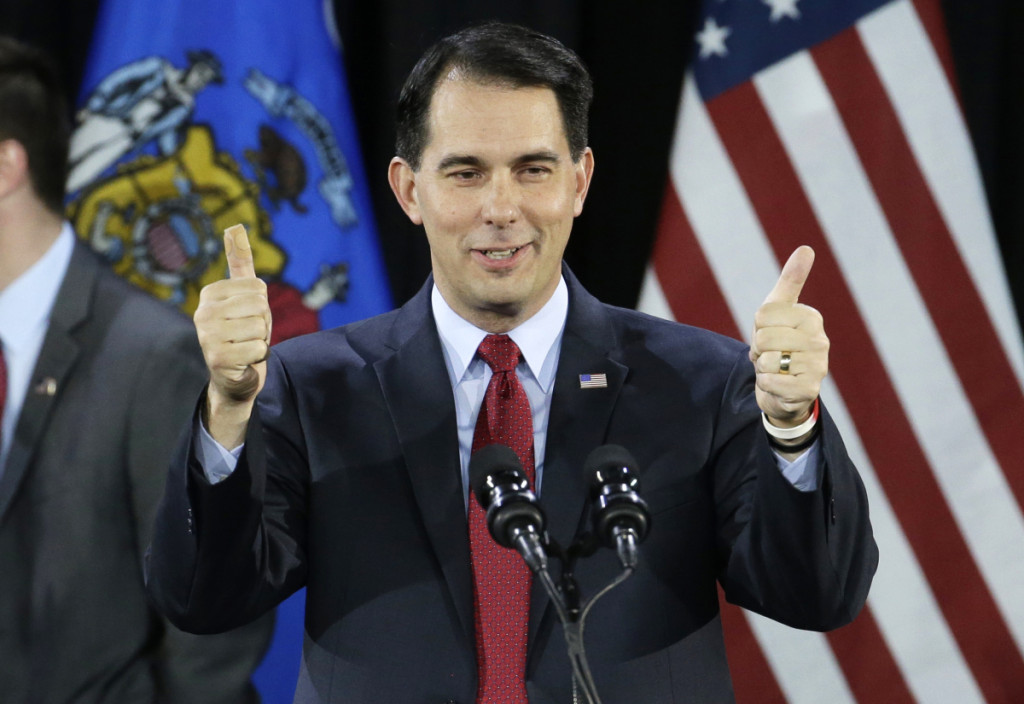
Wisconsin Gov. Scott Walker, a preacher’s son who withstood a recall election spawned by his fight with public employee unions, is joining the crowded Republican presidential race, aides said. The 47-year-old Walker planned to file the paperwork for his long expected candidacy with the Federal Election Commission on Thursday, and kick off the 2016 campaign in the Milwaukee suburb of Waukesha on July 13, the aides said. They spoke on condition of anonymity because they weren’t authorized to publicly discuss the launch ahead of the filing. The governor has traveled throughout the country in the past several months, speaking to conservatives, courting voters and scoring well in some early polls. The jumbled race already had attracted 14 candidates before Walker’s entry. Earlier this week, New Jersey Gov. Chris Christie announced his candidacy. He rose to national prominence soon after his election as governor by pushing for a law in 2011 that effectively ended collective bargaining for most public workers in the state. Four years later, he pressed to make Wisconsin a right-to-work state where employers and unions are barred from requiring all workers to pay union dues. In 2011, protests at the Statehouse grew as large as 100,000 people at times, and Democrats in the state Senate fled Wisconsin for three weeks hoping to undermine Walker’s efforts. Walker’s victories over organized labor certified him as a rising Republican star. It also made him a top target for Democrats and union leaders, who tried to recall Walker in a special election in 2012. Walker beat back the effort, winning by a larger margin than in 2010 and becoming the first governor in U.S. history to survive such an effort. Along the way, he shattered state campaign finance records, collecting six-figure checks from prominent conservatives across the country and building a network he’s tapping now for his presidential bid. In between signing the union laws, Walker, aided by the state’s Republican-controlled Legislature, also worked down a list of conservative priorities. He cut income and corporate taxes by nearly $2 billion, lowered property taxes, legalized the carrying of concealed weapons, made abortions more difficult to obtain, required photo identification when voting and expanded the state’s private school voucher school program. But Walker has made missteps along the way. He promised in 2010 that if elected his policies would lead to the creation of 250,000 private-sector jobs. He fell far short of that, as only about 129,000 jobs were added during his first term, and manufacturing-heavy Wisconsin has lagged the national average in job growth since shortly after Walker took office. His proposed budget cuts to public schools and the University of Wisconsin, the deepest in state history, have generated bipartisan opposition. Walker has been dogged throughout his tenure as governor by two investigations, neither of which has led to any charges of wrongdoing against him. The first, begun in May 2010 while Walker was running for governor, focused on activity within Walker’s county executive office. Six Walker aides and associates were convicted of charges including theft and misconduct in office. The second investigation, which grew out of the first, centered on whether conservative groups illegally coordinated fundraising and other political activity to benefit Walker’s recall campaign and other Republicans who faced recalls in 2011 and 2012. This investigation is on hold while the state Supreme Court weighs lawsuits challenging its validity. Walker is trying to become the first president since Harry Truman, elected nearly 70 years ago, without a college degree. Walker attended Marquette University for three years, but dropped out 34 credits short of graduation in 1990 to take a job with the American Red Cross. Walker ran for the state Assembly that year and lost. He moved to a more conservative district outside of Milwaukee and ran again in 1993, winning that time. He hasn’t lost since. Republished with permission of The Associated Press.
Democratic hopeful Bernie Sanders hopes to find like-minded liberals in Scott Walker’s backyard
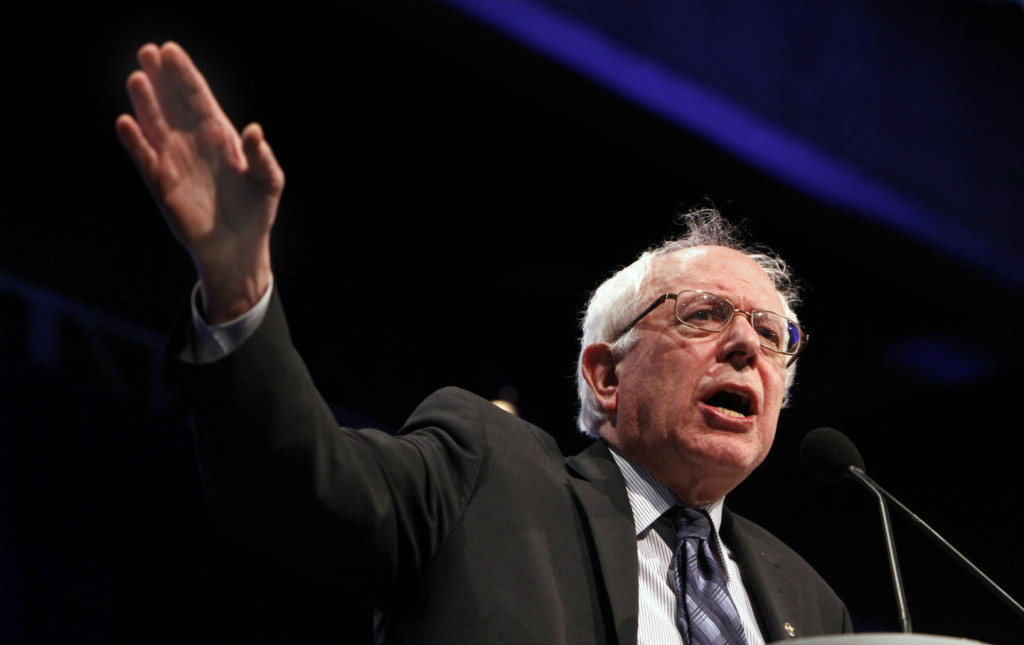
Democratic presidential candidate Bernie Sanders is hoping to tap the long history of liberalism and progressive politics in Wisconsin as he pushes his campaign into Republican Gov. Scott Walker‘s backyard. Sanders has booked the downtown Alliant Energy Center with the goal of filling its 10,000 seats to show his bid to snatch the Democratic nomination from front-runner Hillary Rodham Clinton isn’t a longshot after all. In a conference call ahead of his speech Wednesday night, Sanders told reporters that 9,500 people have said they expect to attend. Sanders, a 73-year-old self-described democratic socialist, is trying to appeal to the most liberal Democrats with his message of raising the minimum wage to $15 an hour, bridging the gap between rich and poor, and raising taxes on the wealthy and Wall Street. Madison, the state’s reliably liberal capital and home to the University of Wisconsin, has its own White House hopeful in Walker, who is preparing to enter the crowded field of GOP candidates. The governor is expected to make his announcement on or shortly after July 13. Sanders said in Tuesday’s call with reporters that he was “strongly opposed” to Walker’s agenda. “We need leadership in this country that stands up for working families, that is prepared to take on the big money interests today that have so much power and so much influence, that we need to strengthen the trade union movement in this country, not break it,” Sanders said. “I suspect that Gov. Walker’s views are very different than that.” Walker criticized Sanders in a statement issued Wednesday in advance of Sanders’ speech. “Bernie Sanders is right about one thing: We don’t need another Clinton in the White House,” he said. “On virtually every other issue, however, he stands in stark opposition to most Americans. Wisconsinites have rejected his top-down, government-knows-best approach three times in the last four years.” Walker’s statement is a reference to his three election victories since 2010. He won election, defeated a recall in 2012 and then won re-election. His victories have helped fuel his all-but-certain run for the White House. Sanders has built his underdog campaign on blunt talk about the economy. In addition to advocating a $15-an-hour minimum wage and raising taxes on the rich, he also supports a massive government-led jobs program to fix roads and bridges, a single-payer health care system, an expansion of Social Security benefits and debt-free college. Republished with permission of the Associated Press.
Inboxes overflow as 2016-ers amp up email appeals for cash

Hillary Clinton has a dinner invite for you. Jeb Bush is out to make a big splash. Rick Santorum wants to scare the heck out of you. Ted Cruz is looking for a sacrifice. Lincoln Chaffee wants to be your pal. Oh, and all of them want your money — and preferably before midnight on Tuesday night, please. Danger: The 2016 presidential candidates are emailing Americans such a flurry of appeals for money and support that the risk of inbox internal combustion is high. With each candidate making his or her own come-on, they’ve been offering voters all sorts of reasons to open their wallets before the quarterly reporting period for raising cash ends on Tuesday. Marco Rubio dangled the chance to win a trip to his Las Vegas birthday party with host Rick Harrison of TV’s “Pawn Stars.” “Official Hillary car magnet — plus free shipping!” reads one Clinton email. “Chip in $10 or more.” Cruz’s recent appeals for cash have included a plea for supporters to make a sacrifice on his behalf. He’s already made his own sacrifices, he tells them, and lists a few, such as the loss of family time and sleep, personal financial strain and the dreaded “pizza diet” on the campaign trail. Never mind the pizza, people: Santorum headlined one donation pitch with this chilling subject line: “ISIS is here.” Bush put his son Jeb Jr. to work trying to line up “5,000 Day One supporters by midnight to prove we’re serious about taking back the White House.” Lincoln Chafee went the let’s-be-pals route, using the subject line “hey” to try to lure voters to click on his email. The Republican candidates, in particular, are playing up the quarterly deadline as a reason to donate NOW and make a statement about their viability in a big pack of rivals. With no one casting votes yet, contributions from legions of grassroots donors can be read as a proxy measure of support, they reason. To be sure, there’s no other big reason to pony up now instead of later. Breathless appeals for cash won’t end Wednesday. But to hear them tell it, the looming reporting deadline is nothing less than the apocalypse. Cruz is running a “One Million Dollar Money Bomb Challenge.” Rubio has a “Let Freedom Ring” money bomb going. And Rand Paul wants $20.16 for his “End of Quarter Money Bomb.” Cruz’s latest emails have helpfully included an “FEC Deadline Countdown” clock showing the days, hours, minutes and seconds left until the Federal Election Commission‘s midnight deadline. “If there is still time on the clock below, then make an IMMEDIATE secure contribution by following this link,” he writes. Scott Walker, who has yet to enter the race, keeps asking supporters whether he should run — and to say so with cold cash. “Your gift today will show me your answer,” he writes. If words alone won’t close the deal, maybe different fonts, italics, bold-faced words, underlined phrases, CAPITAL LETTERS, stripes of color and exclamation points will reel in donations!!! With an oversized Paul vs. Obama photo and giant lettering that evoked a promo for a boxing prizefight, Rand Paul last month turned his opposition to government surveillance programs into a flurry of emails about a “NSA SPYING SHOWDOWN.” No, a simple “donate now” button will not suffice when candidates are lucky if even 20 percent of readers bother to open an email appeal. Campaigns rely on both research and hunches to try to figure out what will work — and there’s a lot happening on both sides of that equation. Cornell University political scientist Adam Seth Levine says campaigns can easily test what messages, words, colors, fonts and formats work best by sending out variations on the same fundraising pitch. “A lot of people don’t realize they are constantly being experimented upon,” says Levine. Campaigns may send out hundreds of variations to figure out what’s most effective, Levine says, analyzing who opens the emails, who clicks on links, what they do next and who ultimately donates. “The one thing they can’t do, which would be extremely Big Brother-ish, is see exactly where your eyes go,” Levine says. For all of those solid metrics, “intuition is going to play a large role because at the end of the day, no campaign is going to be the same as another campaign,” says Ryan Lyk, who runs email marketing for Alexandria, Va.-based IMGE, which works for companies, associations and GOP campaigns. “You’ve got to be creative and innovative with it.” Who’s at the forefront this year? Lyk gives good marks to Rubio for creativity and colorful content, and Carly Fiorina for casual wording that’s easy to relate to yet creates a sense of urgency. He credits Walker with aggressively bulking up his email list. And Clinton, Lyk says, “has all the bells and whistles.” Blue State Digital founder Joe Rospars, chief digital strategist for the 2008 and 2012 Obama campaigns, cautions that there’s a lot more to a winning strategy than simply cutting and pasting what’s worked before. “It really comes down to the relationship you’re building with the people on the other end of the email,” says Rospars. One of the Obama campaign’s most successful pitches to small givers — donate to try to win a meal with him — started as an experiment in 2007 when other candidates were holding fancy dinners with big-dollar contributors, Rospars recalls. Now, Clinton is urging her donors to sign up for a chance to win dinner “with the future President of the United States (knock on wood).” There’s no “donate” button. But you can bet those who sign up will be hearing more from Clinton — and getting the ask. Republished with permission of The Associated Press.
GOP almost set for ’16, with only 3 governors left to get in race
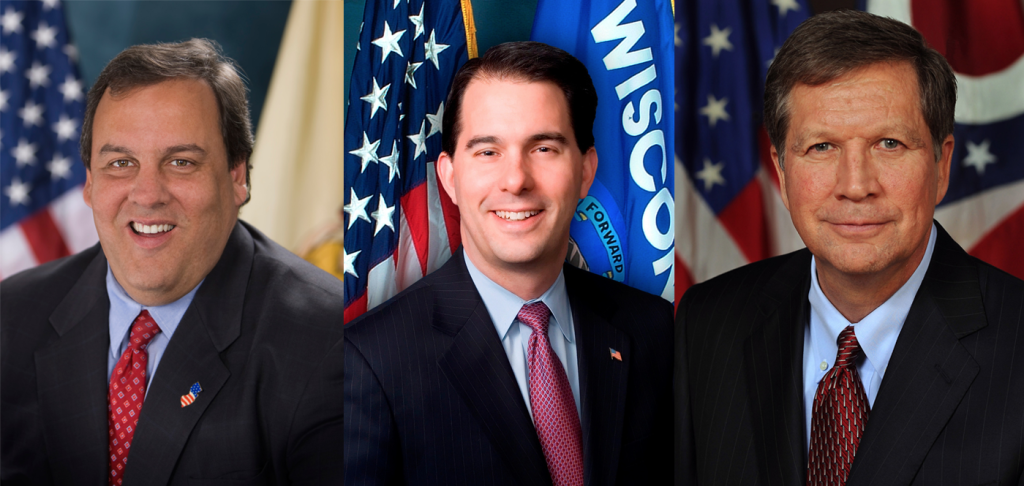
There was a time in Republican presidential politics when Chris Christie was a star, Scott Walker a mystery and John Kasich a memory. Oh, how things can change. Today, they are the last of the GOP’s undeclareds – a trio of ambitious governors whose fortunes have shifted dramatically in recent months, illustrating why it’s far too early to count anyone out in the GOP’s crowded and unruly White House race. “Does anyone remember me?” Kasich, who first ran for president more than a decade ago, said Wednesday as he looked out at a crowd of roughly 200 people gathered for his first Iowa appearance in years. “I’m shocked.” With Louisiana’s Gov. Bobby Jindal formally launching his presidential bid on Wednesday, 13 high-profile Republicans have officially entered the campaign for the party’s 2016 nomination. Only three major prospects remain: Ohio’s Kasich, Wisconsin’s Walker and New Jersey’s Christie, each planning to announce his intentions in the coming weeks. They are expected to join a field with five sitting or former senators, five current or former governors, two business leaders and a retired neurosurgeon. The “in or out” phase of the Republican presidential race is nearing its end, but with just over seven months until Iowa’s leadoff caucuses, no clear leader has emerged in the race for the nomination. “There’s so many candidates, it’s almost impossible for the average person to keep track,” said tea party leader Mark Meckler, who heads up the conservative group Citizens for Self-Governance. Yet the uncertainty in the race has as much to do with one candidate as any other: former Florida Gov. Jeb Bush. The son of one president and brother of another had hoped to overwhelm his Republican competitors by raising tens of millions of dollars and assembling top staff talent during the first half of this year. While aides say Bush’s fundraising has been impressive, he has struggled to break out in early polls, leaving room for party activists on the ground in early-voting states to consider new faces. Kasich is a new face only for those who don’t remember that, 16 years ago, he was a challenger to another presidential candidate named Bush. The 63-year-old Republican governor and former congressman ran a short-lived bid that was quickly dashed by Bush’s older brother, then-Texas Gov. George W. Bush. The often-blunt Kasich says he’s seriously looking at 2016 largely because of Jeb Bush’s inability to match his brother’s dominance, leaving room for a dark-horse candidacy such as his own to catch on. It doesn’t hurt that he posted an overwhelming re-election victory in 2014 in one of the nation’s premier swing states. “Everybody has a place. Everybody can rise,” Kasich said Wednesday, echoing a central theme of Bush’s candidacy. “It’s who delivers the biggest message and who can touch people’s hearts.” Christie, meanwhile, has almost been reduced to an afterthought due to lingering questions about his personality and political baggage following the George Washington Bridge scandal. And while he and Kasich lack Bush’s stacked bank account, they represent perhaps the most direct threat to Bush among those in the race. All three appeal to the party’s more moderate voters. Kasich and Christie were among the few Republican governors to expand Medicaid eligibility as part of President Barack Obama‘s health care law, they have prioritized treatment for drug addicts and the mentally ill, and both have shown a willingness to stand up to those in the farthest reaches of the party’s conservative base. Christie was once considered an early front-runner in the 2016 race, having passed on a bid in 2012. His backers have little doubt that he’s in, as he’s been raising money for both a political action committee and a super PAC, delivering meaty policy speeches and paying visits to key early-voting states – most notably New Hampshire. Kasich and Christie pose a particular challenge to Bush in the nation’s first presidential primary state, which typically favors pragmatic leaders over party ideologues. While Kasich made his first trip to Iowa since 1999 this week, he has been a regular to visitor to New Hampshire in recent months. And underscoring the importance of the state, a person familiar with Christie’s planning says his team has considered setting his official announcement there in an event that could come as early as next week. The person spoke to The Associated Press on condition of anonymity to discuss the topic ahead of Christie’s formal announcement. Walker, meanwhile, has surged into the top tier of his party’s presidential hopefuls after impressing Republicans in Iowa earlier this year, yet he remains largely unknown beyond his base in the Midwest and party activists. Some Republicans see him as having the ability to unite the GOP’s more conservative and moderate wings, and he has said his announcement will come in early- to mid-July. The question for all, Meckler said, is whether they can stand out. “Even knowing who’s in the field is becoming more and more difficult,” Meckler said. Republished with permission of The Associated Press.
Republicans return donations from white supremacist group

Republican presidential candidates, GOP lawmakers and the lone black Republican in the House are returning donations from the leader of a white supremacist group cited by Charleston church murder suspect Dylann Roof or giving the money to charity. Rep. Mia Love of Utah, an African-American Republican woman who was elected to the House last year, said through a spokesman that she had returned $1,000 in donations from Earl Holt, leader of the Council of Conservative Citizens. The presidential campaigns of Sen. Rand Paul, R-Ky., and Rick Santorum said they would donate the money received from Holt to a fund set up by Charleston’s mayor to assist the victims’ families. “I abhor the sentiments Mr. Holt has expressed,” Santorum said in a statement. “These statements and sentiments are unacceptable. Period. End of sentence.” Holt has contributed more than $60,000 to Republicans since 2010, including several White House hopefuls, Federal Election Commission records show. Wisconsin Gov. Scott Walker, who is expected to announce his presidential candidacy next month, has received $3,500 in donations from Holt since 2011. Walker will also donate the money to the charity supporting the victims’ families, said his spokeswoman, AshLee Strong, in an email. An online manifesto purportedly written by Roof, the suspect in last week’s murder of nine African-Americans at a historic church in Charleston, South Carolina, said he learned about “brutal black on white murders” from the Council of Conservative Citizens website. Another presidential hopeful, Sen. Ted Cruz of Texas, said he will return the $8,500 he received from Holt. In a statement posted online Sunday, Holt said that it “was not surprising” that Roof credited his group with his knowledge of black-on-white crime. But he added that the Council of Conservative Citizens is “hardly responsible for the actions of this deranged individual merely because he gleaned accurate information from our website,” and said that the group doesn’t condone illegal activities. Holt also donated to Mitt Romney‘s 2012 presidential campaign and to several current and former GOP members of Congress, including Iowa Rep. Steve King, Arkansas Sen. Tom Cotton, Arizona Sen. Jeff Flake, Iowa Sen. Joni Ernst and former Minnesota congresswoman and presidential candidate Michele Bachmann. In a statement Monday, Cotton said he had taken the initial steps to refund Holt’s contribution. “I do not agree with his hateful beliefs and language and believe they are hurtful to our country,” Cotton said. Flake’s press secretary said Monday the senator is donating his $1,000 to the fund set up in Charleston to help the shooting victims’ families. Ernst’s office said she would do the same with her $1,000 contribution from Holt. The Guardian newspaper first reported the donations. Republished with permission of The Associated Press.


